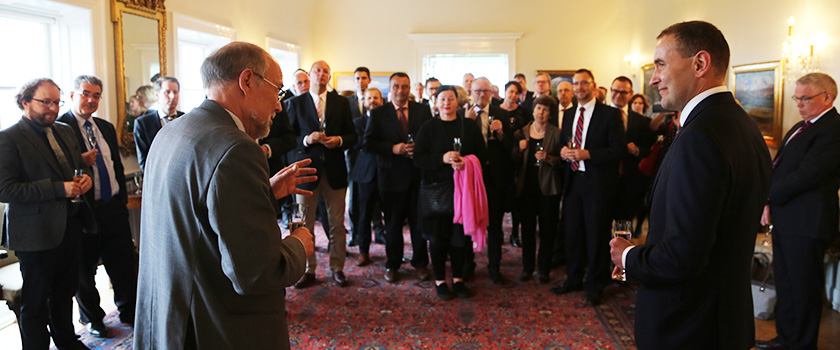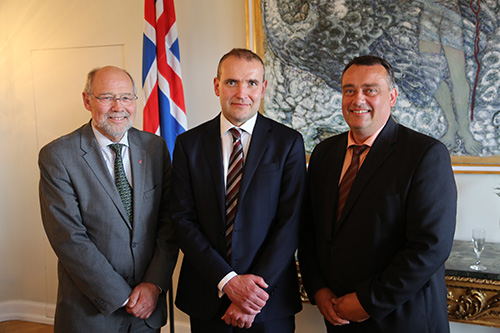
Reception by the President of Iceland, Guðni Th. Jóhannesson (right). At left: Svein Roald Hansen. Photo: EFTA secretariat.
Brexit on the agenda as EEA Joint Parliamentary Committee meets
At the meeting of the EEA Joint Parliamentary Committee in Reykjavik from 22 to 23 May 2017, Brexit was an important topic of discussion.
On the very day the EU adopted its mandate for negotiations with the United Kingdom, and a few days after the EEA Council met in Brussels with EU chief negotiator Michel Barnier, the EFTA parliamentarians considered it important to pursue their dialogue with the European Parliament on the significance of Brexit negotiations for the EFTA countries.
The meeting in Iceland was chaired by Svein Roald Hansen, head of the Storting’s delegation to EFTA and EEA.
“Engaging in continuous dialogue on Brexit with our colleagues in the European Parliament is very important to us. It gives us a chance to highlight that Brexit also refers to an exit by the United Kingdom from the EEA and therefore has major significance for the three EFTA countries in the EEA. We therefore reiterated that ongoing dialogue and consultation with our governments during the negotiations will be critical. Now that the negotiations are about to begin, we should follow them closely, and we want to use the EEA Joint Parliamentary Committee as an arena for closer dialogue with the European Parliament and other EU institutions on this issue,” said Mr Hansen (Labour Party).
The EEA Joint Parliamentary Committee will invite the EU’s chief Brexit negotiator, Michel Barnier, and the European Parliament’s spokesperson on Brexit, Guy Verhofstadt, to the committee’s next meeting in Strasbourg in November.
Energy and social policy

Svein Roald Hansen, head of the Storting EEA/EFTA delegation; President Guðni Th. Jóhannesson of Iceland; and Jørn Dorhmann, head of the European Parliament’s delegation to EEA/EFTA. Photo: The EFTA secretariat.
Other issues raised at the meeting in Reykjavik included the European Commission’s new draft bills on energy and welfare benefit coordination in the EU/EEA. Because processing of these proposals is now well underway in the European Parliament, the status briefing from European colleagues was especially important.
To discuss both topics the EEA Joint Parliamentary Committee had also invited external lecturers from the European Commission, the Icelandic power company Landsvirkjun and the law firm Simonsen Vogt Wiig, among others. As to relevance of the EEA to the new proposals on energy and welfare benefit coordination, it was considered important for the EEA Joint Parliamentary Committee to provide input at an early stage and to obtain more information from EU representatives and external experts.
EU’s Arctic policy
The committee was also briefed on the EU’s Arctic policy, and on the latest developments in the EEA collaboration. The latter is a regular item on the agenda, with the panel consisting of representatives from the EEA Council, the EEA Joint Committee and the EFTA Surveillance Authority (ESA).
The following representatives from the Storting’s EEA/EFTA delegation attended the meeting: Svein Roald Hansen (Labour Party), head of delegation; Gunnar Gundersen (Conservative Party), deputy head; Marianne Aasen (Labour Party); Elin Agdestein (Conservative Party); Geir Toskedal (Christian Democratic Party); Irene Johansen (Labour Party); Sveinung Rotevatn (Liberal Party); Tor André Johnsen (Progress Party); Liv Signe Navarsete (Centre Party) and Heikki Eidsvoll Holmås (Socialist Left Party).
Last updated: 30.05.2017 14:29